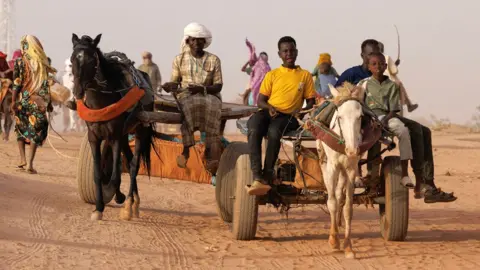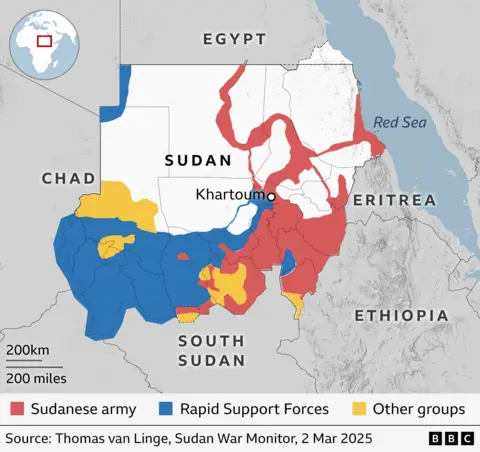Sudan accuses UAE of 'complicity in genocide' at world court
 Getty Images
Getty ImagesThe International Court of Justice (ICJ) is hearing a case brought by Sudan accusing the United Arab Emirates (UAE) of being "complicit in the genocide" during the current civil war.
The two-year conflict, which has pitted Sudan's army against the paramilitary Rapid Support Forces (RSF), has led to tens of thousands of deaths and forced more than 12 million from their homes.
Sudan alleges that the UAE has been arming the RSF with the aim of wiping out the non-Arab Massalit population of West Darfur. The UAE has said the case is a cynical publicity stunt and is seeking an immediate dismissal.
Since the war began, both the RSF and the Sudanese army have been accused of committing atrocities.
According to Sudan's case, the RSF has carried out systematic attacks on non-Arab groups, especially the Massalit community, with the intent to destroy them as a distinct ethnic group.
Among other things, it also alleges that the RSF has used rape as a weapon against civilians.
At the beginning of this year the US also accused the RSF of committing genocide and imposed sanctions on its leader Mohamed Hamdan Dagalo, also known as Hemedti.
Gen Hemedti has previously denied its fighters have deliberately targeted civilians.
As the ICJ deals with disputes between states, Sudan's military government cannot take the RSF to the court.
Instead it has brought the case against one of its alleged sponsors.
Sudan argues that these atrocities were enabled by extensive financial, military and political support from the UAE, including arms shipments, drone training and the recruitment of mercenaries.
It says this means the UAE is complicit in genocide.
Sudan is seeking reparations and urgent measures to prevent further genocidal acts.
In court on Thursday, Sudan's legal team argued that there was a risk of plausible harm to the Masalit people and there was an urgent need for the ICJ to intervene to ensure no further genocidal acts are committed.
Sudan has requested the judges to rule that the UAE should be blocked from supplying the RSF. And the UAE should report back to the court on how these measures are being implemented.
In her response in court, the UAE's ambassador to the Netherlands Ameirah Alhefeiti began by describing the violence in Sudan as "heart-breaking".
But she added that Sudan had not brought the case to The Hague to ease the suffering but rather to deflect from its own actions and was using the court as a stage to attack the UAE.
An earlier statement from the government said the ICJ was "not a stage for political theatrics, and it must not be weaponised for disinformation".
The ambassador said that her country had not provided arms to either of the warring parties, and rather that the UAE had worked tirelessly to alleviate suffering by, for example, setting up field hospitals.
The UAE's lawyers have argued that the case should be thrown out.
Most legal experts appear to agree the case has little chance of going beyond this point.
The UAE has a reservation - or opt out - to the Genocide Convention which has meant in previous cases, the ICJ does not have jurisdiction over these types of claims.
However, in bringing its grievances to the UN's top court, Sudan has drawn attention to what it alleges is the UAE's role in the conflict.
In terms of what happens next, it should be known within a matter of weeks if the judges decide they have the power to act on Sudan's request for them to issue what essentially amounts to an injunction - provisional measures for the UAE to fulfil its commitments to prevent acts of genocide.
ICJ rulings are legally binding, but the court itself has no direct powers to enforce its decisions.

More BBC stories on Sudan:
 Getty Images/BBC
Getty Images/BBCGo to BBCAfrica.com for more news from the African continent.
Follow us on Twitter @BBCAfrica, on Facebook at BBC Africa or on Instagram at bbcafrica
